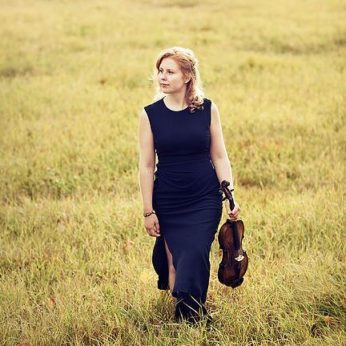Composer: Benjamin Britten (b. 1913 - d. 1976)
Performance date: 07/07/2019
Venue: Bantry Library
Composition Year: 1950
Duration: 00:15:42
Recording Engineer: Ciaran Cullen, RTÉ
Instrumentation: fl, ob, cl, bn, hn
Instrumentation Category:Duo
Artists:
Ellen Nisbeth -
[viola]
Izabella Simon -
[piano]

Ellen Nisbeth [viola], Izabella Simon [piano]
Benjamin Britten [1913-1976]
Lachrymae Op.48 [1950]
Reflections on a song of John Dowland for viola and piano
Lento – Allegretto, andante comodo – Animato – Tranquillo – Allegro con moto – Largamente – Appassionato – Alla Valse moderato – Allegro marcia (quasi ponticello) – L’istesso tempo
In 1949 Britten, in the midst of composing Billy Budd, unwillingly agreed to a twenty concert North American recital tour with Pears beginning in New York. There Britten was introduced to the viola player William Primrose, whom Britten immediately booked to play at the next Aldeburgh Festival. In return he promised to write a piece for him, Britten himself also being a violist. Seemingly Britten forgot his promise until Primrose rang looking for his score. It’s in the post the composer claimed and proceeded to write it overnight and joined the violist at the premiere. Many years later Britten promised to orchestrate it for another violist, Cecil Aronowitz – a promise he fulfilled a few months before his death reworking the original score for viola and small string orchestra.
Lachrymae is constructed as a set of variations – Britten called them reflections – on a song by John Dowland, whose gloomy voice is particularly suited to the viola’s dark sound. Dowland’s If my complaints could passions move was the chosen melody, but the title Lachrymae comes from Dowland’s even more famous song Flow my tears, whose melody is sneaked into the Appassionato 6th variation. As well as paying homage to his Tudor predecessor in this work, he picked another of Dowland’s songs Come heavy sleep for his Nocturnal composed for Julian Bream to play at the 1964 Aldeburgh Festival.
Instead of announcing the theme at the beginning, Britten gives us a Lento introduction followed by eight reflections on the theme before revealing Dowland’s full melody in the very last section. He begins mysteriously with quiet hints at the theme troubled by a series of jagged intrusions. The first reflection is even more uncertain and hesitant leading to a delightful pizzicato dance. The third Tranquillo reflection is enlivened by little flourishes from the viola. The subsequent reflections, all less than a minute long, build cumulatively to the final one, which is almost frenzied in its approach, taking the viola up to its most extreme upper register before calming to give Dowland the last word with a full statement of his song’s theme.
Francis Humphrys
Copyright © 2024 West Cork Music. All rights reserved.
Designed and developed by Matrix Internet